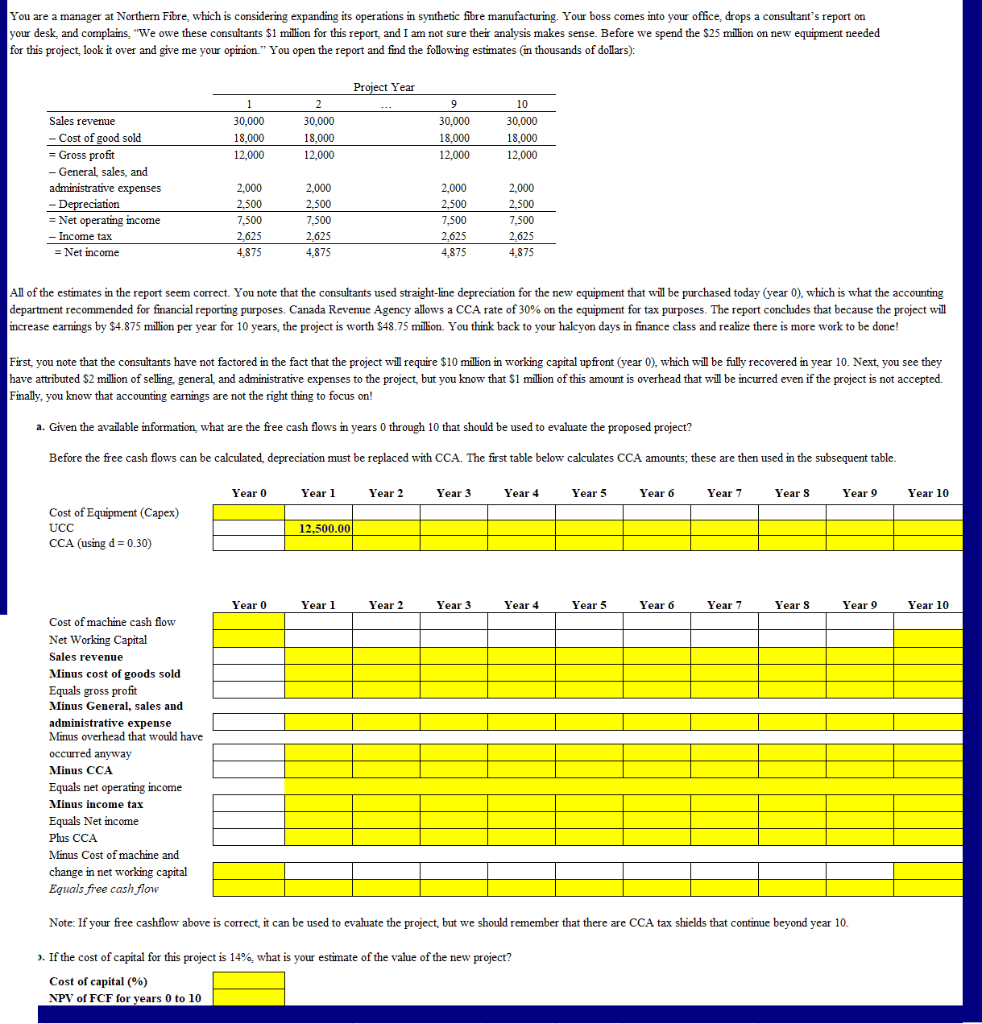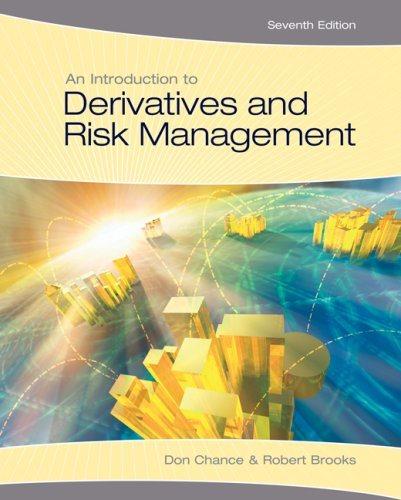Answered step by step
Verified Expert Solution
Question
1 Approved Answer
u can take this one as a reference because he got 4 likes https://www.chegg.com/homework-help/questions-and-answers/score-0-3-pts-11-17-10-complete-n-score-475-19--problem-9-17b-question-help-manager-northe-q29616835 You are a manager at Northern Fibre, which is considering expanding
 u can take this one as a reference because he got 4 likes
u can take this one as a reference because he got 4 likes
https://www.chegg.com/homework-help/questions-and-answers/score-0-3-pts-11-17-10-complete-n-score-475-19--problem-9-17b-question-help-manager-northe-q29616835
You are a manager at Northern Fibre, which is considering expanding its operations in synthetic fibre manufacturing. Your boss comes into your office, drops a consultants report on your desk and complains. "We owe these consultants $1 million for this report, and I am not sure their analysis makes sense. Before we spend the $25 million on new equipment needed for this project, look it over and give me your opinion." You open the report and find the following estimates (in thousands of dollars): Project Year 1 30,000 2 30.000 18,000 12,000 9 30,000 18,000 12,000 10 30.000 18.000 12,000 18.000 12.000 Sales revenue - Cost of good sold = Gross profit - General, sales, and administrative expenses - Depreciation = Net operating income - Income tax = Net income 2,000 2,500 7,500 2,625 4.875 2,000 2.500 7,500 2.625 4,875 2.000 2.500 7,500 2.625 4.875 2,000 2.500 7,500 2,625 4.875 All of the estimates in the report seem correct. You note that the consultants used straight-line depreciation for the new equipment that will be purchased today (year 0), which is what the accounting department recommended for financial reporting purposes. Canada Revenue Agency allows a CCA rate of 30% on the equipment for tax purposes. The report concludes that because the project will increase earnings by $4.875 million per year for 10 years, the project is worth $48.75 million. You think back to your halcyon days in finance class and realize there is more work to be done! First, you note that the consultants have not factored in the fact that the project will require $10 million in working capital upfront (year 0), which will be fully recovered in year 10. Next, you see they have attributed $2 million of selling, general and administrative expenses to the project, but you know that $1 million of this amount is overhead that will be incurred even if the project is not accepted. Finally, you know that accounting earnings are not the right thing to focus on! a. Given the available information, what are the free cash flows in years 0 through 10 that should be used to evaluate the proposed project? Before the free cash flows can be calculated depreciation must be replaced with CCA. The first table below calculates CCA amounts; these are then used in the subsequent table. Year 0 Year 1 Year 2 Year 3 Year 4 Year 5 Year 6 Year 7 Year 8 Year 9 Year 10 Cost of Equipment (Capex) UCC CCA (using d = 0.30) 12,500.00 Year 0 Year 1 Year 2 Year Year 3 Year 4 Year 5 Year 6 Year 7 Year 8 Year 9 Year 10 Cost of machine cash flow Net Working Capital Sales revenue Minus cost of goods sold Equals gross profit Minus General, sales and administrative expense Minus overhead that would have occurred anyway Minus CCA Equals net operating income Minus income tax Equals Net income Plus CCA Minus Cost of machine and change in net working capital Equals free cash flow Note: If your free cashflow above is correct, it can be used to evaluate the project, but we should remember that there are CCA tax shields that continue beyond year 10 5. If the cost of capital for this project is 14%, what is your estimate of the value of the new project? Cost of capital (%) NPV of FCF for years 0 to 10 You are a manager at Northern Fibre, which is considering expanding its operations in synthetic fibre manufacturing. Your boss comes into your office, drops a consultants report on your desk and complains. "We owe these consultants $1 million for this report, and I am not sure their analysis makes sense. Before we spend the $25 million on new equipment needed for this project, look it over and give me your opinion." You open the report and find the following estimates (in thousands of dollars): Project Year 1 30,000 2 30.000 18,000 12,000 9 30,000 18,000 12,000 10 30.000 18.000 12,000 18.000 12.000 Sales revenue - Cost of good sold = Gross profit - General, sales, and administrative expenses - Depreciation = Net operating income - Income tax = Net income 2,000 2,500 7,500 2,625 4.875 2,000 2.500 7,500 2.625 4,875 2.000 2.500 7,500 2.625 4.875 2,000 2.500 7,500 2,625 4.875 All of the estimates in the report seem correct. You note that the consultants used straight-line depreciation for the new equipment that will be purchased today (year 0), which is what the accounting department recommended for financial reporting purposes. Canada Revenue Agency allows a CCA rate of 30% on the equipment for tax purposes. The report concludes that because the project will increase earnings by $4.875 million per year for 10 years, the project is worth $48.75 million. You think back to your halcyon days in finance class and realize there is more work to be done! First, you note that the consultants have not factored in the fact that the project will require $10 million in working capital upfront (year 0), which will be fully recovered in year 10. Next, you see they have attributed $2 million of selling, general and administrative expenses to the project, but you know that $1 million of this amount is overhead that will be incurred even if the project is not accepted. Finally, you know that accounting earnings are not the right thing to focus on! a. Given the available information, what are the free cash flows in years 0 through 10 that should be used to evaluate the proposed project? Before the free cash flows can be calculated depreciation must be replaced with CCA. The first table below calculates CCA amounts; these are then used in the subsequent table. Year 0 Year 1 Year 2 Year 3 Year 4 Year 5 Year 6 Year 7 Year 8 Year 9 Year 10 Cost of Equipment (Capex) UCC CCA (using d = 0.30) 12,500.00 Year 0 Year 1 Year 2 Year Year 3 Year 4 Year 5 Year 6 Year 7 Year 8 Year 9 Year 10 Cost of machine cash flow Net Working Capital Sales revenue Minus cost of goods sold Equals gross profit Minus General, sales and administrative expense Minus overhead that would have occurred anyway Minus CCA Equals net operating income Minus income tax Equals Net income Plus CCA Minus Cost of machine and change in net working capital Equals free cash flow Note: If your free cashflow above is correct, it can be used to evaluate the project, but we should remember that there are CCA tax shields that continue beyond year 10 5. If the cost of capital for this project is 14%, what is your estimate of the value of the new project? Cost of capital (%) NPV of FCF for years 0 to 10Step by Step Solution
There are 3 Steps involved in it
Step: 1

Get Instant Access to Expert-Tailored Solutions
See step-by-step solutions with expert insights and AI powered tools for academic success
Step: 2

Step: 3

Ace Your Homework with AI
Get the answers you need in no time with our AI-driven, step-by-step assistance
Get Started


